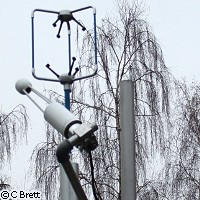The ICOS project: balancing Europe's carbon budget
Work has begun on the development of an integrated system to monitor greenhouse gas concentrations in Europe, helping policy makers evaluate the effectiveness of legislation designed to tackle climate change. Dubbed ICOS (the 'Integrated carbon observation system'), the initiative is one of 44 pan-European research infrastructures featured in the European Roadmap for Research Infrastructures; an updated version of the roadmap was released at the recent European Conference on Research Infrastructures (ECRI2008) in Versailles, France. Fossil fuel emissions have risen sharply in recent years; while just over half of these greenhouse gases are taken up by carbon sinks on land and in the ocean, the rest accumulate in the atmosphere. The aim of the ICOS project is to set up a comprehensive monitoring system that will provide detailed information on where carbon is emitted in Europe and where the carbon sinks are. Crucially, it will also reveal how carbon sinks are themselves affected by climate change; in the hot, dry summer of 2003, Europe's terrestrial ecosystems, which are usually carbon sinks, released large amounts of their stored carbon, making them carbon sources. ICOS will set up a network of monitoring stations comprising state-of-the-art instrumentation across Europe and extending into neighbouring regions of Siberia and Africa. These will measure both local and atmospheric changes in the levels of CO2 and other greenhouse gases such as methane. Data gathered at these stations will be fed rapidly into a central data centre, allowing scientists to monitor flows of carbon through ecosystems in near real time. The preparatory phase of ICOS, which is just getting underway, is funded to the tune of EUR 4,299,996 by the 'Research infrastructures' budget line of the Seventh Framework Programme (FP7) and will run until 2012. During this period, the scientists will test and select the instrumentation to be used at the monitoring stations; to ensure the comparability of the data, the stations will use the same equipment and a central analytical lab will provide calibration and quality control analyses. ICOS is scheduled to enter its operational phase in 2012 and is expected to run for around 20 years. Total construction costs of the network amount to EUR 128 million and the operational costs are estimated to be around EUR 14 million a year. The ICOS team is also working closely with similar initiatives located in other parts of the world, such as North America, Japan and Australia. Data from all these initiatives is gathered into a single database and the partners meet every two years to exchange information and ideas.
Countries
France



